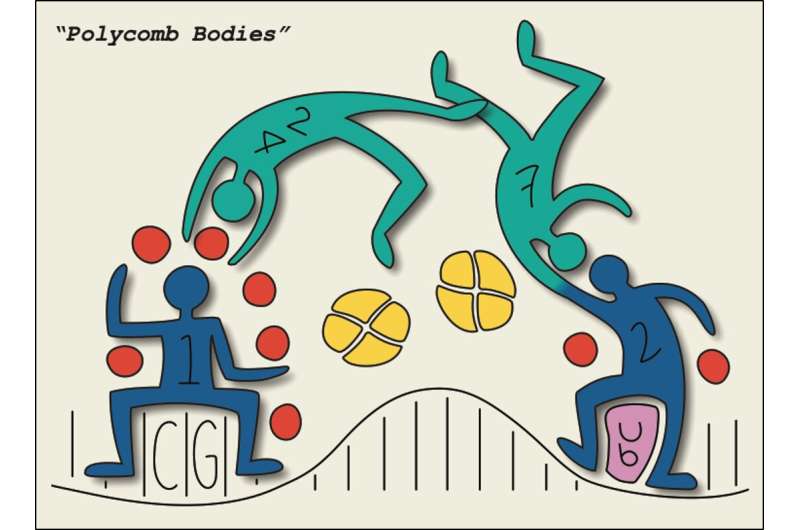Cellular identity discovery has potential to impact cancer treatments

A team of scientists led by those in Trinity College Dublin has discovered new mechanisms involved in establishing cellular identity, a process that ensures the billions of different cells in our bodies do the correct job. This new discovery in stem cells—a result so surprising that the team initially believed it to be an error in the lab—has potential translational impacts in cancer biology and associated targeted treatments.
The research focuses on the workings of Polycomb protein complexes, PRC1 and PRC2, which are studied by Professor Adrian Bracken and his team, based in Trinity’s School of Genetics and Microbiology. Ph.D. student, Ellen Tuck, describes these proteins as “strict librarians” inside cells. “PRC1 and PRC2 block access to certain areas of the genetic library, such that a neuron cell won’t have access to muscle genes, and it doesn’t get confused in its cellular identity.”
A puzzle regarding PRC2 has intrigued the Bracken lab and other scientists in the field for years: two forms (PRC2.1 and PRC2.2) exist in the cell but the Bracken lab previously showed that the two forms of PRC2 target the same regions of DNA and do the same job. So why do we need two versions?
The new discovery from the lab takes an exciting step towards answering this conundrum, as the team found that PRC2.1 and PRC2.2 recruit different forms of the PRC1 complex to DNA, thereby finally explaining why two versions are needed.
“This took us by complete surprise. We initially thought there must have been a technical issue with the experiment, but multiple replications confirmed that we had in fact stumbled upon a fascinating new process that reshapes our understanding of the hierarchical workflow of Polycomb complexes. We were dancing around the lab,” said Dr. Eleanor Glancy, recalling the evening the team finally realized what the data were telling them.
Successful Ph.D. graduate of the Bracken lab, Dr. Eleanor Glancy, together with Postdoctoral researcher, Dr. Cheng Wang, spearheaded the work, with important collaborative support from scientists in Italy and the Netherlands. The team has published the work today in journal Molecular Cell.
This research by Trinity scientists represents a massive contribution to the field of chromatin and epigenetics research and has further impact in cancer biology research as the genes encoding Polycomb proteins are frequently mutated in cancers.
Professor Bracken said, “My team currently studies the effects of these mutations in childhood brain cancers and adult lymphomas, seeking to understand what biological mechanisms go awry and how we can target these complexes with more effective treatments. A firm and comprehensive understanding of the workings of these complexes is critical to figuring out new ways to target them in cancer settings. Therefore, this work led by Dr. Glancy and Dr. Wang in my lab will be built upon here and by other researchers worldwide to advance our approach to many cancers.”
The team worked through the COVID-19 pandemic shutdown, social distancing measures, failed hypotheses, failed experiments and tight deadlines, maintaining belief and determination, to ultimately make a significant advance in our biological knowledge.
More information:
Adrian P. Bracken, PRC2.1 and PRC2.2 Specific Accessory Proteins Drive Recruitment of Different Forms of Canonical PRC1, Molecular Cell (2023). DOI: 10.1016/j.molcel.2023.03.018. www.cell.com/molecular-cell/fu … 1097-2765(23)00208-3
Citation:
Cellular identity discovery has potential to impact cancer treatments (2023, April 7)
retrieved 7 April 2023
from https://phys.org/news/2023-04-cellular-identity-discovery-potential-impact.html
This document is subject to copyright. Apart from any fair dealing for the purpose of private study or research, no
part may be reproduced without the written permission. The content is provided for information purposes only.
For all the latest Science News Click Here
For the latest news and updates, follow us on Google News.

